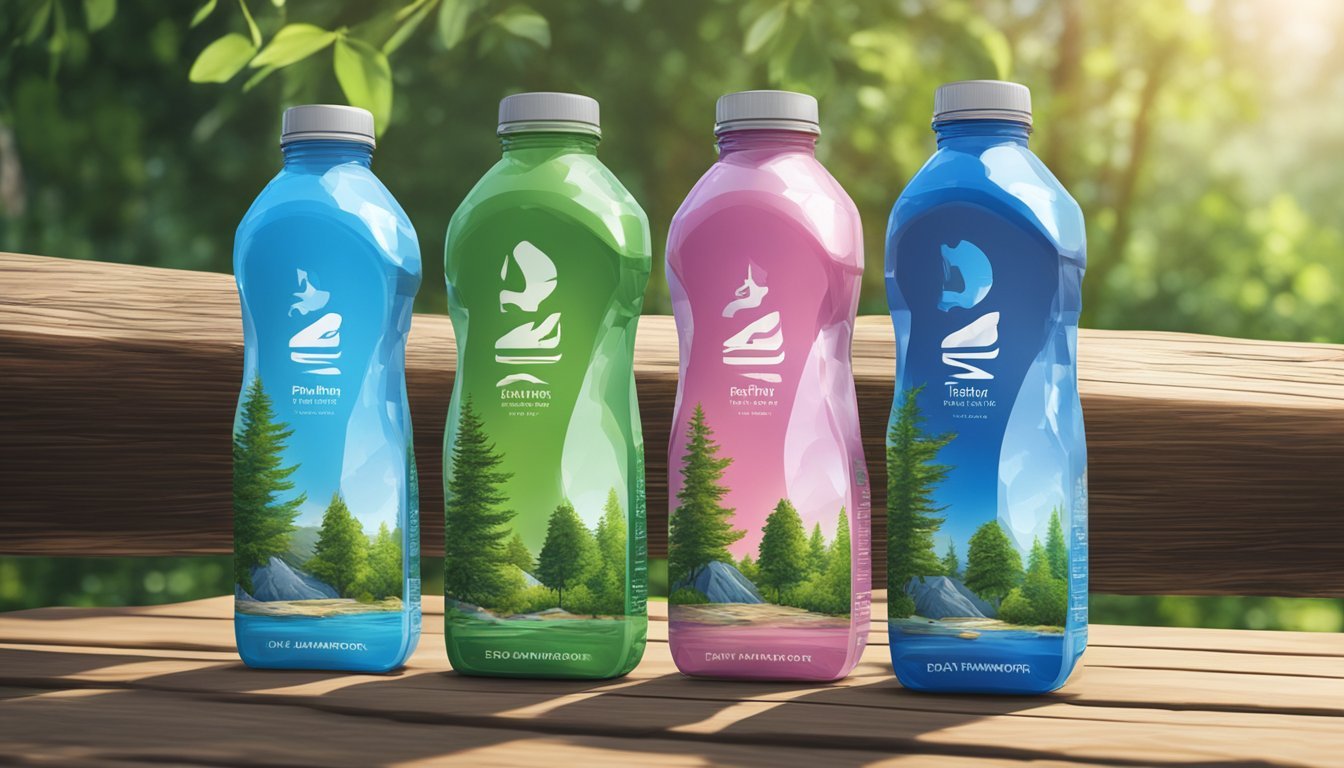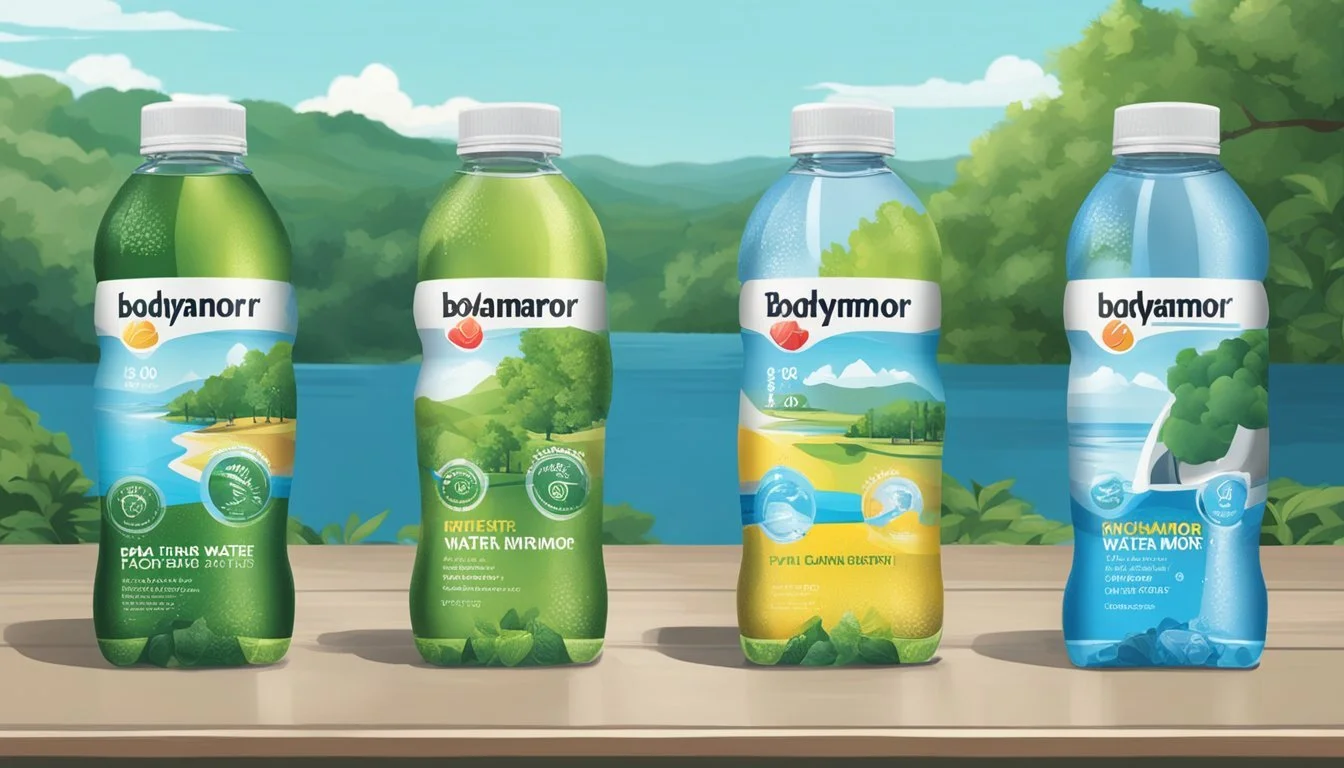Path vs. BodyArmor
Comparing the Best Bottled Water Choices
When choosing between Path and BodyArmor, many consumers wonder which bottled water offers superior benefits. BodyArmor excels in functional hydration, catering specifically to active lifestyles with its high potassium content and added electrolytes. This makes it an excellent choice for those seeking a beverage that supports their workout and recovery routines.
Path, on the other hand, focuses on sustainable packaging and clean, crisp hydration. While it might not have the same specialized nutritional profile as BodyArmor, it appeals to eco-conscious individuals who prioritize environmental impact along with their hydration needs.
Whether you are a fitness enthusiast needing enhanced electrolytes or someone who values sustainability and pure taste, this comparison aims to help you make an informed decision on which bottled water aligns best with your priorities.
Comparing Path and BodyArmor
This section explores the origins and values of Path and BodyArmor, as well as the variety of products they offer. Discover how these brands cater to different hydration needs and preferences.
Brand Origins and Values
Path is positioned as an environmentally friendly brand with a focus on sustainability. Their mission is to reduce plastic waste by offering reusable aluminum bottles. This approach appeals to environmentally conscious consumers who prioritize eco-friendly products.
BodyArmor, on the other hand, emphasizes health and wellness. Founded in 2011, the brand targets active individuals and athletes seeking enhanced hydration. BodyArmor products are known for their inclusion of electrolytes, vitamins, and natural ingredients. The company aims to provide functional benefits along with hydration, making their products suitable for fitness enthusiasts.
Product Range and Varieties
Path offers a straightforward selection. They focus on their signature reusable aluminum bottle, which contains purified still water. This simplicity aligns with their mission of promoting sustainability and reducing single-use plastics. The minimalist product line appeals to those looking for a basic, high-quality hydration option without frills.
BodyArmor provides a diverse array of beverages. These include BodyArmor SportWater, BodyArmor Lyte, and a range of flavored sports drinks. SportWater is marketed as an alkaline water with a pH level of 8+, aiming to provide enhanced hydration and recovery. BodyArmor Lyte is a lower-calorie option with the same functional benefits. Their flavored drinks are enriched with electrolytes, coconut water, and vitamins, catering to those who need replenishment during physical activity.
Health and Hydration
Both Path and BodyArmor offer unique benefits aimed at improving health and hydration. Understanding their roles in athletic performance and their nutritional content can help you decide which one best suits your needs.
Hydration and Athletic Performance
Path and BodyArmor are designed to help athletes stay hydrated during high-intensity workouts and endurance exercises. BodyArmor contains a blend of electrolytes such as sodium, potassium, and magnesium, which are essential for maintaining hydration and reducing muscle cramps. These electrolytes are particularly beneficial for athletes who need a quick rehydration solution.
Path water is often marketed as a premium, natural mineral water. It contains naturally occurring minerals like calcium, magnesium, and chloride, which contribute to bone health and essential bodily functions. Although it may not contain the same added electrolytes as BodyArmor, its natural composition supports general hydration needs.
Athletes should consider their specific hydration needs. BodyArmor provides a more functional approach with a focus on rapid rehydration and performance boost, making it ideal for athletes involved in long-duration or high-intensity workouts. Meanwhile, Path offers a more natural hydration option that supports everyday hydration and basic mineral replenishment.
Nutritional Content and Benefits
When comparing the nutritional content, BodyArmor offers a variety of added vitamins and minerals that cater to athletic performance. It typically includes vitamins C, B3, B5, B6, and B9, which are crucial for maintaining energy levels and overall well-being.
However, one of the notable aspects of BodyArmor is its sugar content. With around 21 grams of cane sugar per serving, it provides quick energy but may not be suitable for those monitoring their sugar intake. The drink also utilizes natural flavors and colors derived from real fruit juice, adding to its appeal for athletes seeking additional nutrition.
Path mineral water, on the other hand, does not contain added sugars or artificial additives. Its benefits lie in its naturally occurring minerals like calcium and magnesium, which support various bodily functions, including bone health and muscle function. While it doesn't offer the same level of added nutrients as BodyArmor, it provides a clean and straightforward hydration solution without the added sugars or calories.
Water Quality and Safety
Evaluating bottled water involves looking at its filtration processes, pH levels, and mineral balance, among other safety measures. The specifics of each brand reveal their commitment to delivering clean, safe drinking water.
Filtration and Purification Processes
BodyArmor water uses reverse osmosis to ensure high levels of purity. This method effectively removes contaminants, resulting in purified water with low mineral content.
Path water sources from a natural aquifer, claiming to maintain the water's natural mineral profile while ensuring purity through rigorous filtration.
Brands like Icelandic Glacial also emphasize natural purity, using glacial sources that inherently have fewer contaminants.
Fiji water bottles their water directly at the source in the protected aquifer of Viti Levu, Fiji, ensuring minimal contact with pollutants.
Using BPA-free containers provides an added layer of safety, preventing harmful chemicals from leaching into the water.
pH Levels and Mineral Balance
BodyArmor SportWater advertises a pH of 8 or higher, signifying alkaline water. However, testing revealed a pH around 7, closer to neutral pH.
Path water maintains a balance with added minerals, aimed at enhancing pH balance and taste.
Smartwater Alkaline boasts a pH over 9, indicating strong alkalinity, beneficial for those seeking alkaline water for its supposed health benefits.
Fiji and Icelandic Glacial naturally maintain a higher pH, due to their unique sources, adding beneficial minerals that contribute to overall water quality.
Balancing pH levels and maintaining a good mineral content are crucial for taste and potential health benefits. Different brands achieve this through either natural means or deliberate alkaline enhancements.
Taste and Consumption Experience
Taste and consumption experiences are crucial when comparing Path and BodyArmor bottled waters. The focus will be on flavor profiles, the types of sweeteners used, and sensory attributes such as smell and consistency.
Flavor Profiles and Sweeteners
BodyArmor offers an array of unique flavors made with real fruit juice and natural flavors. This ensures a more robust and refreshing taste. It does not use any artificial sweeteners, sticking to natural options, which many consumers find appealing.
Path, on the other hand, is known for its clean taste, partly due to its pure, natural mineral content. It doesn’t add any flavoring or sweeteners, making it a solid choice for those who prefer unflavored water. Contrastingly, BodyArmor's flavored variations are suited for those who need a variety in taste.
Core Hydration and Essentia both pride themselves on their balanced pH levels and clean, crisp taste. Essentia's proprietary ionization process also claims to enhance the taste by removing bitter-tasting acidic ions. Both brands appeal to consumers looking for high-quality, neutral-tasting water without any additives.
Sensory Attributes: Smell and Consistency
BodyArmor's flavored waters often have a light, pleasant aroma due to the natural fruit juices used. The consistency remains thin and hydrating, without any syrupy feel. This makes it an excellent choice during physical activities, offering both hydration and a sensory pleasing experience.
Path water does not carry any discernible smell, leaning towards a neutral scent. Its consistency is crisp and refreshing, largely due to the pure mineral content. This simplicity makes it ideal for people who prefer water without any added sensory elements.
Comparatively, Core Hydration and Smartwater also excel in this area. Core Hydration's neutral pH aims to mimic the body's natural state, offering a smooth, almost silky mouthfeel. Smartwater, particularly its alkaline version, provides a slightly thicker consistency that some consumers find more satisfying. Both brands keep the sensory experience minimal to focus more on the purity and quality of the water itself.
Economic and Environmental Considerations
Path and BodyArmor bottled waters offer distinct economic and environmental attributes that may sway consumers based on their priorities such as cost, accessibility, and sustainability.
Packaging and Environmental Impact
Path features aluminum bottles, boasting a better environmental profile compared to traditional plastic. Aluminum is highly recyclable and often considered more environmentally friendly. Consumers interested in sustainability find this packaging appealing due to its reduced carbon footprint.
BodyArmor, on the other hand, uses PET plastic, which is widely recyclable but still poses concerns due to its contribution to plastic pollution. Despite being a healthier alternative, the environmental impact of PET containers is significant, with substantial CO2 emissions during production. This makes Path a preferable choice for eco-conscious consumers seeking a premium bottled water option.
Cost and Accessibility
BodyArmor is usually priced competitively, making it accessible at many grocery and convenience stores. Its association with sports drinks by Coca-Cola adds to its pervasive availability. Path, positioned as a luxury brand, is often more expensive but provides good value for those who prioritize environmental benefits and premium quality.
Availability of Path can be more limited, often found in specialty stores rather than common grocery outlets. This exclusivity may enhance its appeal as a premium product but limits its accessibility compared to more ubiquitous brands like BodyArmor, Voss, and Aquafina. For many, the choice hinges on balancing cost with ecological concerns.
Market Presence and Consumer Choices
Both Path and BodyArmor have established significant market presence by targeting specific consumer needs through their distinct offerings.
Brand Reputation and Market Trends
Path focuses on natural spring water and emphasizes sustainability with its reusable aluminum bottles. Their reputation is strong among environmentally-conscious consumers and those seeking pure, minimally processed water. Path has capitalized on market trends that lean towards eco-friendly practices and premium water quality.
BodyArmor, primarily known for its sports drinks, features their BodyArmor SportWater. This product is aimed at athletes and active individuals. Their brand is highly regarded in basketball and other sports communities, often seen as a competitor to Gatorade. BodyArmor leverages its reputation for enhancing athletic performance.
Consumer Preferences and Lifestyle Alignment
Path appeals to consumers who prioritize sustainability and the health benefits of natural spring water. Their customers often value low-calorie and sugar-free options, aligning with a health-conscious lifestyle.
BodyArmor, on the other hand, caters to those focused on sports performance and recovery. Their range includes variations with added sugars, electrolytes, and flavors like orange mango. This aligns with consumers who are active and need hydration solutions that support rigorous physical activity. The presence of citric acid and caffeine in some products also appeals to those looking for an energy boost.
Conclusion
Both Path and BodyArmor have distinct features that cater to different preferences and needs.
Path offers a sustainable packaging solution with its refillable aluminum bottles. This eco-friendly approach appeals to those who prioritize environmental concerns. Additionally, Path's water is sourced from pristine locales, ensuring high quality and purity.
On the other hand, BodyArmor is designed with active individuals in mind. It comes with added electrolytes like sodium, potassium, and magnesium, which are beneficial for hydration and muscle function. The inclusion of vitamins B3, B5, B6, B9, and B12 further supports energy and recovery.
Price is another crucial factor. Path tends to be higher priced due to its reusable bottle and premium branding. In contrast, BodyArmor is more affordable and widely accessible, making it a popular choice for everyday hydration needs.
Taste and flavor preference also play significant roles. Path offers a clean, natural taste, while BodyArmor incorporates natural flavors and real fruit juice, providing a pleasant drinking experience.
User Reviews from various sources highlight that both products have their strong points. Enthusiasts of Path appreciate its sustainability and purity, whereas fans of BodyArmor value its functional benefits and added nutrients.
In making a choice, users should consider their top priorities, whether it's sustainability and purity with Path, or functional benefits and affordability with BodyArmor. Each brand delivers on its promise, creating a unique hydration experience tailored to different needs.
More About Path
Mountain Valley Spring Water vs Path: Which Bottled Water is Better?
Path vs Whole Foods Italian Still Mineral water: Which Bottled Water is Better?
More About BodyArmor
BodyArmor vs Kirkland Signature: Which Bottled Water is Better?
Cascade Mountain vs BodyArmor: Which Bottled Water is Better?
Hawaii Volcanic vs BodyArmor: Which Bottled Water is Better?
Hawaiian Springs vs BodyArmor: Which Bottled Water is Better?
Icelandic Glacial vs BodyArmor: Which Bottled Water is Better?
Mountain Valley Spring Water vs BodyArmor: Which Bottled Water is Better?
Nestle Pure Life vs BodyArmor: Which Bottled Water is Better?
Richard's Rainwater vs BodyArmor: Which Bottled Water is Better?
Solan de Cabras vs BodyArmor: Which Bottled Water is Better?
Talking Rain AQA vs BodyArmor: Which Bottled Water is Better?
Whole Foods 365 vs BodyArmor: Which Bottled Water is Better?
Whole Foods Italian Still Mineral water vs BodyArmor: Which Bottled Water is Better?






